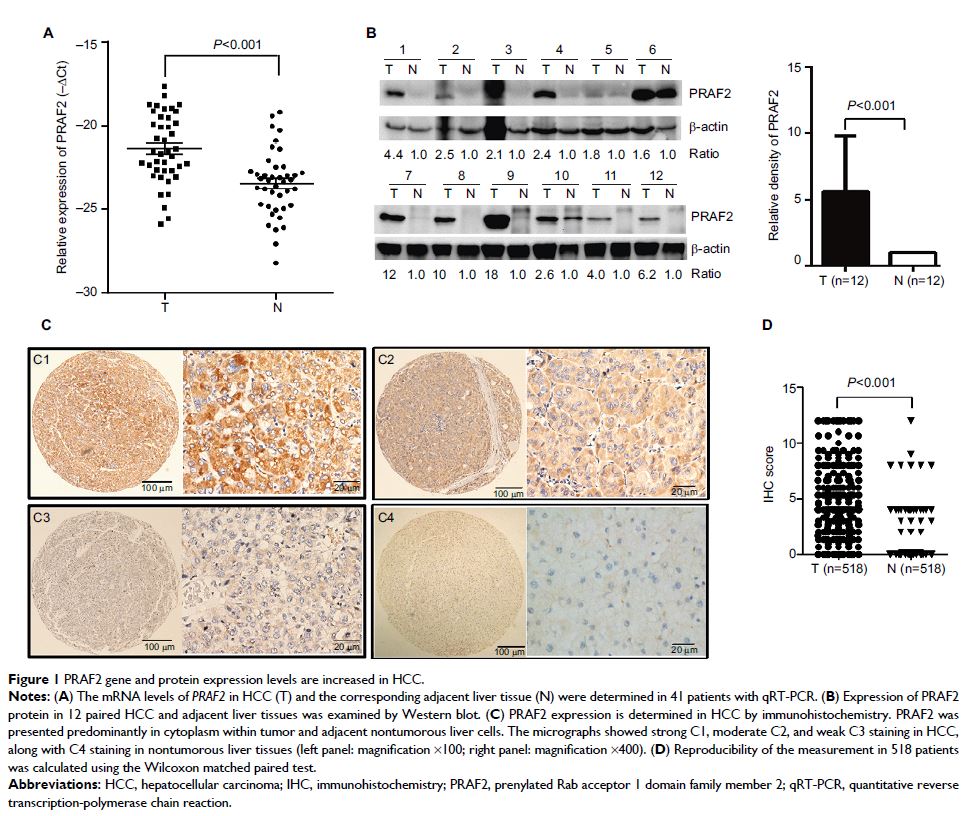108605
论文已发表
注册即可获取德孚的最新动态
IF 收录期刊
- 3.4 Breast Cancer (Dove Med Press)
- 3.2 Clin Epidemiol
- 2.6 Cancer Manag Res
- 2.9 Infect Drug Resist
- 3.7 Clin Interv Aging
- 5.1 Drug Des Dev Ther
- 3.1 Int J Chronic Obstr
- 6.6 Int J Nanomed
- 2.6 Int J Women's Health
- 2.9 Neuropsych Dis Treat
- 2.8 OncoTargets Ther
- 2.0 Patient Prefer Adher
- 2.2 Ther Clin Risk Manag
- 2.5 J Pain Res
- 3.0 Diabet Metab Synd Ob
- 3.2 Psychol Res Behav Ma
- 3.4 Nat Sci Sleep
- 1.8 Pharmgenomics Pers Med
- 2.0 Risk Manag Healthc Policy
- 4.1 J Inflamm Res
- 2.0 Int J Gen Med
- 3.4 J Hepatocell Carcinoma
- 3.0 J Asthma Allergy
- 2.2 Clin Cosmet Investig Dermatol
- 2.4 J Multidiscip Healthc

PRAF2 表达显示了肝细胞癌的不良临床结果
Authors Wang CH, Liu LL, Liao DZ, Zhang MF, Fu J, Lu SX, Chen SL, Wang H, Cai SH, Zhang CZ, Zhang HZ, Yun JP
Received 27 February 2018
Accepted for publication 7 June 2018
Published 25 July 2018 Volume 2018:10 Pages 2241—2248
DOI https://doi.org/10.2147/CMAR.S166789
Checked for plagiarism Yes
Review by Single-blind
Peer reviewers approved by Dr Amy Norman
Peer reviewer comments 3
Editor who approved publication: Professor Kenan Onel
Introduction: Prenylated Rab acceptor 1 domain family member 2 (PRAF2 ), a novel oncogene, has been
shown to be essential for the development of several human cancers; however,
its role in hepatocellular carcinoma (HCC) remains unclear.
Materials and
methods: PRAF2 mRNA and protein expressions
were examined in fresh tissues by quantitative reverse transcription-polymerase
chain reaction and Western blot, respectively, and in 518 paraffin-embedded HCC
samples by immunohistochemistry. The correlation of PRAF2 expression and
clinical outcomes was determined by the Student’s t-test, Kaplan–Meier test,
and multivariate Cox regression analysis. The role of PRAF2 in HCC was
investigated by cell viability, colony formation, and migration assays in vitro
and with a nude mouse model in vivo.
Results: In our study, the PRAF2 expression was noticeably increased in HCC
tissues at both the mRNA and protein levels compared with that of the
nontumorous tissues. Kaplan–Meier analysis indicated that high PRAF2 expression
was correlated with worse overall survival in a cohort of 518 patients with
HCC. The prognostic implication of PRAF2 was verified by stratified survival
analysis. The multivariate Cox regression model revealed PRAF2 as an
independent poor prognostic factor for overall survival (hazard ratio = 1.244,
95% CI: 1.039–1.498, P <0.017) in HCC.
The in vitro data demonstrated that PRAF2 overexpression markedly enhanced cell
viability, colony formation, and cell migration. Moreover, ectopic expression
of PRAF2 promoted tumor growth and metastasis in vivo.
Conclusion: Collectively, we conclude that PRAF2 is increased in HCC and is a
novel unfavorable biomarker for prognostic prediction for patients with HCC.
Keywords: PRAF2, prognosis, proliferation, migration, hepatocellular
carcinoma
